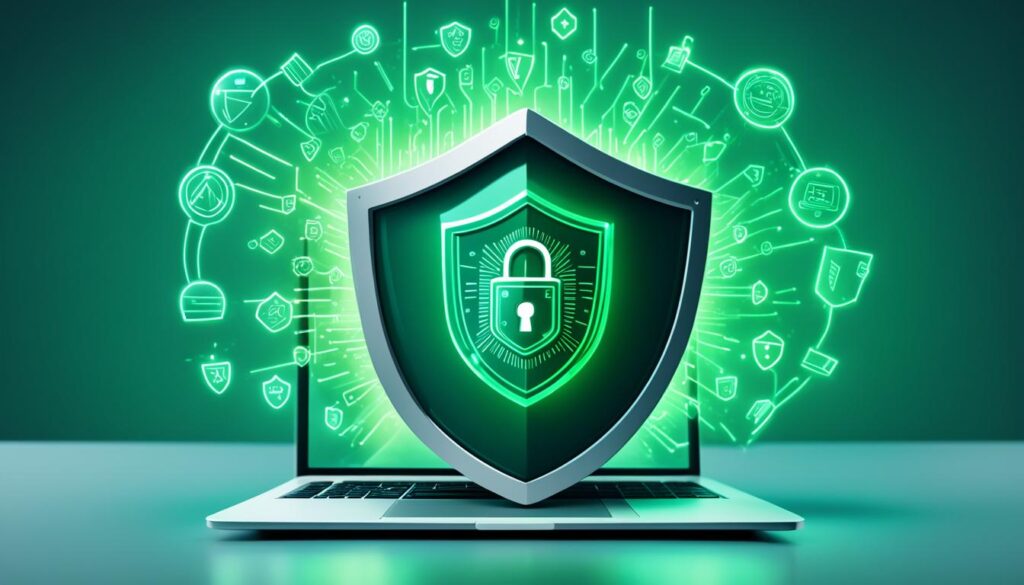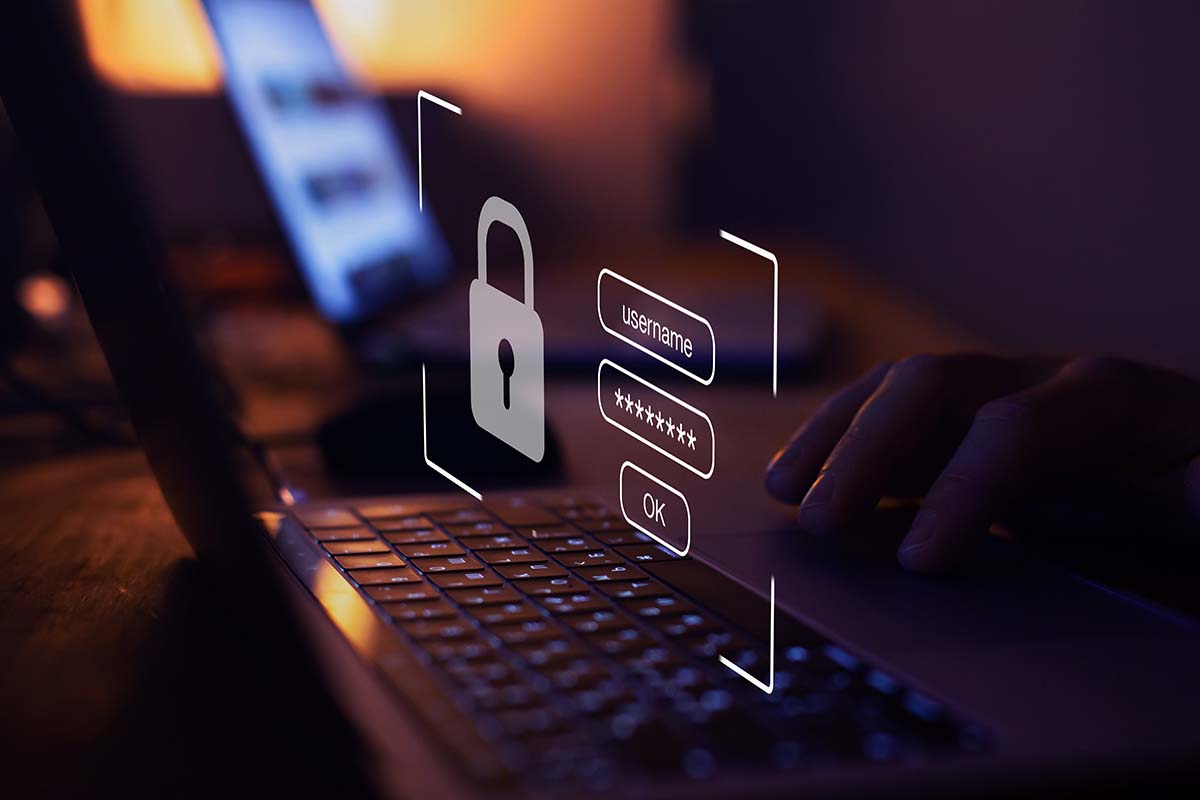Cybersecurity Basics: Protect Your Digital Life
In today’s world, keeping our online lives safe is vital. Many cyber threats, like malware and data breaches, can harm us. Even those who know a lot about technology can be at risk. But you can make a big difference by learning to stay secure online. How can you, as an individual, build a strong foundation of cybersecurity knowledge and practices?
Welcome to Ark Solvers’ guide to essential cybersecurity tips. We’ll cover everything from the danger of cyber threats to maintaining cyber solid hygiene. We aim to help you stay safe online with helpful advice and strategies.
Read More: What is Cybersecurity? Types, Threats, and Cyber Safety Tips
Key Takeaways
- Understand the growing threat of cyber attacks and the consequences of a data breach
- Learn the fundamentals of building a robust cyber hygiene
- Discover essential cybersecurity practices to safeguard your digital identity
- Secure your home network and protect your valuable data
- Stay informed and proactive in the ever-evolving landscape of cybersecurity
Understanding the Importance of Cybersecurity
In today’s digital age, cybersecurity is a significant concern for everyone. Cyber threats like malware, phishing scams, and identity theft are on the rise, so it’s vital to know why keeping our digital lives safe is so important.
Read More: why is cyber security important?
The Growing Threat of Cyber Attacks
Cyber attacks come in many forms, from ransomware to phishing scams. These dangers online are getting smarter by the day. They target our data and seek ways to get around our defenses.
The cost of cybercrime could hit $6 trillion by 2021, a shocking number. Everyone, from businesses to individual users, could be a victim. The damage a cyber attack can cause is enormous.
Read More: Different Types of Cyber Security: A Comprehensive Guide
The Consequences of a Cyber Breach
A cyber breach can cause many problems, such as financial loss and identity theft. It can also damage trust, hurt a company’s name, and lead to legal trouble. In today’s world, protecting data is a top priority.
A cyber attack can result in trust loss, reputation damage, and fines. Such an event can devastate people and companies. It shows why we must be careful and informed online.
The value of cybersecurity cannot be overstated. To defend our digital lives, we should understand the risks and consequences of cyber attacks. In the next section, we’ll learn how to practice cyber hygiene. This knowledge and these tools will help keep your online world safe.
Read More: Exploring the Various Types of Cyber Security Threats

Building a Strong Cyber Hygiene
Vital cyber hygiene is critical to protecting your digital stuff. We’ll show you the steps to keep your devices and networks safe, including how to set up firewalls, use access controls, and apply encryption techniques for your essential data.
The first step to solid cyber hygiene is ensuring your firewall is set up correctly. A firewall acts like a guard, watching the traffic coming in and going out. A good firewall setup lowers the risk of bad people accessing your network.
Also, managing who can get to your devices and data is essential. That’s where access controls come in. By controlling who can enter, you protect against data breaches. This keeps sensitive info safe, ensuring only the right people can use it.
And remember encryption. It’s vital for solid cyber hygiene. Encryption turns your info into a secret code that needs a unique key to unscramble. Putting encryption on your stuff helps keep it hidden from anybody without that key.
Read more: Who needs cyber security?
Following these top cyber hygiene points helps make your digital world safer. It reduces the chances of big problems from cyber incidents, so keeping your online life secure is worth the effort.
- Configuring firewalls to monitor and control network traffic
- Implementing access controls to manage who can access your devices and networks
- Leveraging encryption techniques to protect sensitive data
- Regularly reviewing and updating your security policies and protocols
- Staying vigilant and responsive to potential cyber incidents
Cybersecurity Basics: Essential Practices
Keeping your digital life safe starts with some essential steps. We’ll look at updating software and antivirus, plus crafting solid passwords. These basics help keep malware, threats, and data breaches at bay.
Read More: What is Malware? Malware Definition, Types, and Protection
Updating Software and Antivirus
It’s essential to keep your software and antivirus up-to-date. Updates fix security holes and boost defenses, so ensure your devices have the latest protection against cyber threats.
Setting up automated updates can make this job more manageable. It ensures your devices stay safe without much effort. This can lower the chances of getting hit by malware.
Read more: Cyber Security for Beginners: Key Concepts and Strategies
Creating Strong Passwords
Strong passwords keep your information safe from prying eyes. Use a mix of letters, numbers, and symbols, which makes passwords hard to guess or crack.
- Avoid personal info, common words, or patterns in passwords.
- Think about using a password manager to keep your passwords safe.
- Adding two-factor or multi-factor verification can make your accounts more secure.
Focusing on updates and good password habits makes a big difference. It boosts your cybersecurity, protecting your data from attacks and breaches.
Protecting Your Online Identity
Keeping your online identity safe is very important in our digital world. Cybercriminals are constantly finding new ways to get your data, putting you at risk for identity theft and financial scams. To stay safe, learn about phishing scams and control your social media privacy. These steps can keep your digital life secure.
Recognizing Phishing Scams
Phishing is a trick cybercriminals use to get your sensitive data. They might send fake emails, texts, or social media messages. These look real and come from people or groups you trust. Be cautious. Avoid giving personal info in response to unknown requests. Check the emails and links carefully to make sure they are safe.
Managing Social Media Privacy
Social media is a big part of life now. But it can also put your data at risk. Criminals can use your posts for theft or other harmful activities. Thus, review your settings often,
Alertness to phishing and privacy on social media is vital to protecting yourself online. Remember, being proactive is the best way to stay safe.
Securing Your Home Network
Home networks are critical to our online activities in today’s digital age. This includes streaming movies, working from home, or browsing the web. It’s vital to keep your home network secure. We will look into setting up firewalls, controlling access, and other steps to keep your network and devices safe from harm.
Configuring Firewalls and Access Controls
Firewalls are your network’s first defense, stopping unauthorized access. Setting up your firewall correctly is essential to making your network safer. You can block suspicious activity with the proper rules and only let trusted devices in.
Using access controls is also crucial. They let you control who and what is allowed on your network. You can do this by setting passwords for your Wi-Fi and guest networks and by controlling what different users can access.
- Ensure your firewall is on and set up to watch for and stop suspicious activity.
- Use solid and different passwords for your Wi-Fi and the router to keep out unwanted users.
- Think about adding a guest network to keep your leading network more secure.
- Control who can use your network and what they can access to protect sensitive info.
You significantly improve your network security by setting up firewalls and access controls. You make it harder for others to access your network or cause harm. This lowers the chance of unauthorized access and cyber threats.
Taking steps to secure your home network is essential in the digital world. By using firewalls, access controls, and being watchful, you protect your devices and information from cyber-attacks and data breaches. A well-protected network is the start of a safe digital life.
Safeguarding Your Data
Protecting your private information is critical in today’s world. Everyone needs to keep their personal and work data safe. We’ll discuss using strong encryption and innovative backup plans to protect what matters most to you.
Encryption Techniques
Encryption helps fight online threats by turning your data into a secret code. This ensures that no one can get in without permission. Robust encryption methods like AES and RSA shield your files, emails, and messages. These encryption methods are vital for keeping your data safe and your information hidden from prying eyes.
Backup Strategies
Backing up your data is as important as keeping it safe through encryption. A good backup can save you if your system crashes or gets hacked. Having multiple backups is wise, like saving in the cloud and on a device you keep offline. This way, you can make sure your data is always there, even after a bad day.
- Regular backups of your essential files and documents
- Automated cloud-based backups for seamless data protection
- Offline storage, such as external hard drives or USB drives, for an additional layer of security
Using these encryption methods and good backup plans means preparing for the worst. You can protect your digital stuff and lower the chances of losing it all in a cyber attack or accident.
Conclusion
In today’s fast-changing digital world, setting up cybersecurity policies is crucial. This helps keep your personal and work information safe. If you grasp how critical cybersecurity is, you can shield yourself against cyber attacks.
To improve your cyber hygiene, start with these steps: Update your software and antivirus often. Also, create strong passwords. Doing this will make you more aware of security and lower the danger of facing threat management issues.
It is vital to be alert and consistently boost your cybersecurity. With these basics, you can take charge of your online safety, protecting critical data and your presence on the web.
Read More: Is Cyber Security Expensive? Cost Insights Revealed
FAQ
What is cybersecurity, and why is it important?
Cybersecurity means protecting our digital world, including systems, networks, and information, from harm. It’s vital because our lives are heavily reliant on technology. Cyber threats can lead to financial hits, stolen identities, or damaging our reputation.
What are the common types of cyber threats?
Common cyber threats include malware, phishing, DDoS attacks, and identity theft. These threats aim to steal data, cause system disturbances, or even cause money loss. Thus, protecting against such threats is critical.
How can I build cyber-solid hygiene?
To have good cyber hygiene:
- Update your software and antivirus often.
- Use solid and varied passwords.
- Set up firewalls, control who can access what, and encrypt your data.
- Always be alert and improve your security measures regularly.
How can I recognize and avoid phishing scams?
Spot and dodge phishing scams by noticing sure signs. Be wary of urgent requests for personal info. Also, check for strange email addresses or URLs and watch for spelling mistakes. Only click on links or hand out private details after verifying the source.
How can I secure my home network?
To secure your home network:
- Begin your router’s firewall and activate network encryption. Employ robust passwords.
- Keep your route’s software up to date. Think about ad
IngTwo-factor authentication is used to maintain device and network safety.
St practices for protecting my data?
To safeguard your data:
- Use potent encryption methods and make backups of your vital files frequently.
- Be careful about how and where you store important information.
- Consider using encrypted messaging apps or protected cloud storage






